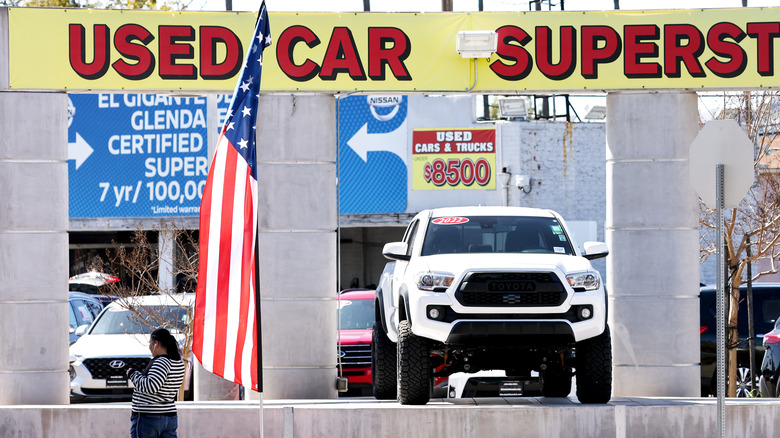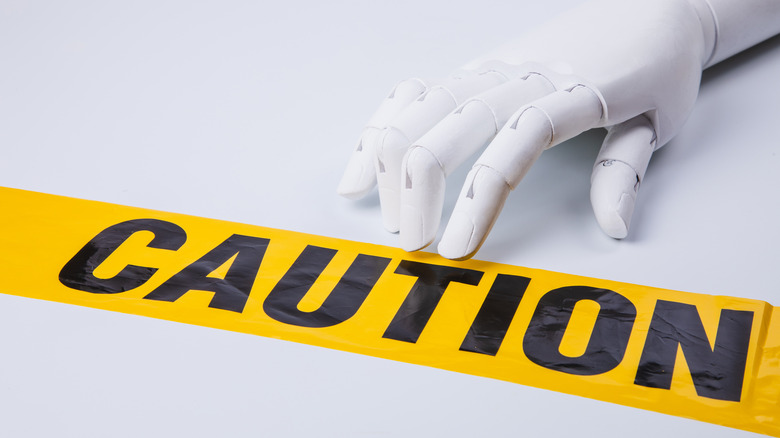You've Been Warned: Buying A Used Car Could Come With Some Unexpected Taxes
Overall, deciding to buy a used car can make good sense. According to the Kelley Blue Book Report, the average transaction price of a new car in July 2025 was a whopping $48,841. Plus, many makes and models that include American brands will be costing more because of President Donald Trump's automotive tariffs, making the strategic selection of a used car a great money saver. Although purchasing a used car can save buyers plenty of money on the sticker price, it's important to beware of a potential trap related to sales tax. Although it might not initially sound ominous that buyers are responsible for the sales tax, it might be when considering that includes outstanding amounts, if any, that the person selling the car didn't pay.
In most states, buyers must pay sales tax on car purchases (new and used) as well as on car leases. Sales tax rates are set by individual states with no national sales tax policy, meaning that these tax rates vary. The applicable rate on a used car purchase will be based upon the state where the car will be registered (where the buyer lives) rather than the state where the buyer purchased the vehicle.
How to avoid this sales tax trap
Before buying a used car, consider contacting the Department of Motor Vehicles (DMV) in the seller's state and providing them with the VIN. Ask if all fees have been paid in full on this vehicle. If the seller is reluctant for this step to occur, that's a huge red flag. Some of this information may be available on the DMV's website, too. Also ask the DMV if you should check any other sources. Then get whatever clearance paperwork you can obtain that states how no past taxes or other dues are associated with the vehicle. If some amount is due, ensure that the seller pays it off before you buy the vehicle (because, afterwards, those fees are the new owner's responsibility). If that doesn't happen, find another vehicle.
To find out ahead of time what you would owe as a buyer, be aware of the sales tax rate where you live. States that don't have sales tax on car purchases include Alaska, Delaware, Montana, New Hampshire, and Oregon. The state with the lowest sales tax rate on cars is Alabama at 2%. Others with low sales tax rates (defined as 2% through 4.5%) include Colorado, Hawaii, Louisiana, Missouri, New Mexico, New York, North Carolina, Oklahoma, South Dakota, and Virginia. The states with the highest sales taxes for cars, defined as 7% or higher, include California, Indiana, Kansas, Rhode Island, and Tennessee. Also investigate if local tax surcharges exist where you live.
Avoiding other risks with buying used cars
One common way to buy a used car is through a dealership. Be careful, though, because going to a small car dealership could cost you because they may not have access to comprehensive information on the vehicle's history like at a larger dealership. To protect themselves, buyers can get a vehicle history report (VHR) like ones available through AutoCheck or CarFax. Another place to look: the National Motor Vehicle Title Information System (NMVTIS).
Another route to buying a used car is from a private party, connecting online, by word of mouth, through seeing signage on the vehicle, and so forth. Although buying this way may save money on the sales price, it's especially important to check for unpaid sales taxes and other fees on private car sales. Be aware, too, that used cars bought on Facebook can come with plenty of risk. A 2024 study by TSB Bank in the UK showed that 34% of Facebook ads were fraudulent with the most scammed items being vehicles (21% of the scams). People clicking on ads were sometimes taken to a fake website. Or the sellers demanded the payment of fees in advance. Other sellers refused to allow potential buyers to see the items for sale in person, which could because the sellers used stock photos, causing the vehicles or other items for sale to look in much better shape or of otherwise higher quality than they actually were.


